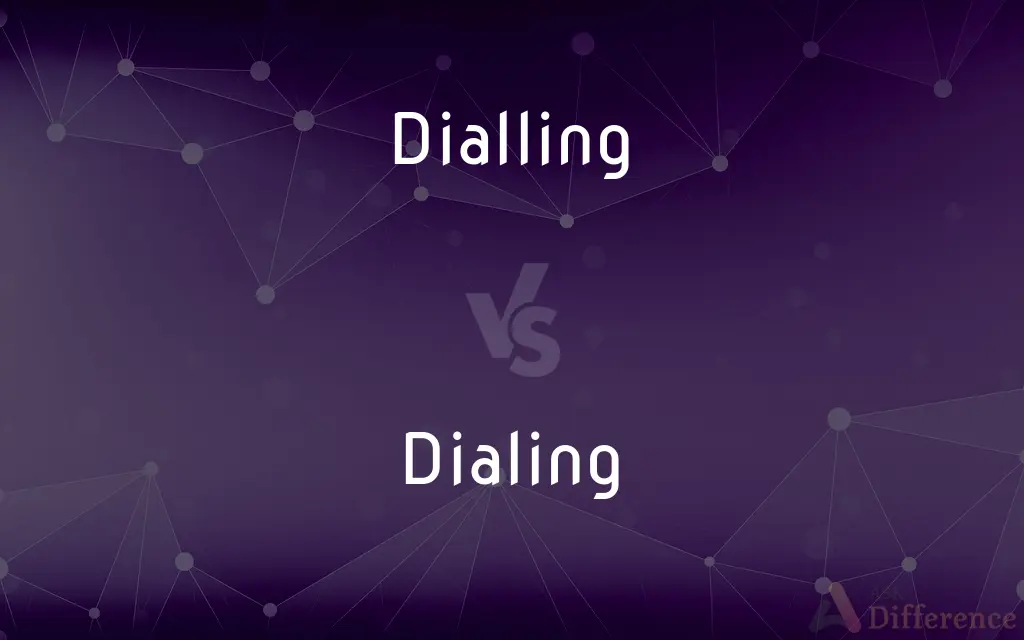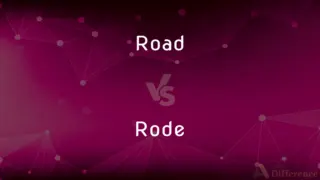Dialling vs. Dialing — What's the Difference?
By Tayyaba Rehman & Fiza Rafique — Updated on March 14, 2024
"Dialling" is the British English spelling for the act of operating a telephone or selecting settings on a device. "Dialing" is the American English variant, used in the same contexts but with a single "l."

Difference Between Dialling and Dialing
Table of Contents
ADVERTISEMENT
Key Differences
"Dialling" and "dialing" both refer to the action of making a telephone call by pressing buttons or turning a dial on a phone. The difference in spelling reflects the variety of English being used: "dialling" follows British English conventions, where verbs ending in a vowel plus "l" double the "l" when adding endings like "-ing" or "-ed." American English, however, typically does not double the "l" in such instances, hence "dialing."
In the context of technology beyond telephones, both terms also apply to selecting or setting options on various devices, from radios to computer interfaces, where one might "dial in" settings. Despite the differences in spelling, the meaning and use in context are the same, emphasizing the action of selecting or initiating communication or settings.
The transition from rotary dials to buttons and then to touchscreens and voice commands in telephones and devices has broadened the metaphorical use of "dialling/dialing." Regardless of the spelling, it now encompasses any action of setting up or initiating a connection or configuration, even in digital interfaces where no physical dial is present.
When choosing between "dialling" and "dialing," the key consideration is the intended audience's familiarity with British or American English conventions. This choice can affect readability and the perceived correctness of the text, depending on the audience's expectations.
In educational or professional writing, adherence to the appropriate variant of English is important for consistency and clarity. Writers and editors should ensure that they use the spelling that aligns with the other language conventions in their text, whether it be American or British English.
ADVERTISEMENT
Comparison Chart
Spelling
British English
American English
Usage
Making telephone calls, adjusting settings
Making telephone calls, adjusting settings
Context
Applies to both traditional and modern devices
Applies to both traditional and modern devices
Variants
Reflects English language conventions
Reflects English language conventions
Audience Consideration
Preferred in British English contexts
Preferred in American English contexts
Compare with Definitions
Dialling
British English spelling for making a phone call by pressing buttons or turning a dial.
She remembered dialling her friend's number late at night.
Dialing
Follows American English spelling rules, with a single "l."
Dialing the hotline, she hoped for a quick response.
Dialling
Reflects British English convention of doubling consonants.
After dialling the wrong number, he quickly hung up.
Dialing
Preferred in American English writing and communication.
Instructions for dialing emergency services were posted on the wall.
Dialling
Indicates action in telecommunication, irrespective of device type.
Dialling on a smartphone requires just a few taps.
Dialing
Applies to various methods of making calls, including modern smartphones.
Dialing from a contact list makes the process faster and easier.
Dialling
Used in contexts adhering to British spelling and grammar rules.
He was accustomed to dialling international codes before making a call.
Dialing
American English spelling for the act of initiating a phone call.
He was dialing her number to confirm the meeting time.
Dialling
A graduated surface or face on which a measurement, such as speed, is indicated by a moving needle or pointer.
Dialing
A graduated surface or face on which a measurement, such as speed, is indicated by a moving needle or pointer.
Dialling
The face of a clock.
Dialing
The face of a clock.
Dialling
A sundial.
Dialing
A sundial.
Dialling
The panel or face on a radio or television receiver on which the frequencies or channels are indicated.
Dialing
The panel or face on a radio or television receiver on which the frequencies or channels are indicated.
Dialling
A movable control knob or other device on a radio or television receiver used to change the frequency.
Dialing
A movable control knob or other device on a radio or television receiver used to change the frequency.
Dialling
A rotatable disk on a telephone with numbers and letters, used to signal the number to which a call is made.
Dialing
A rotatable disk on a telephone with numbers and letters, used to signal the number to which a call is made.
Dialling
To measure with or as if with a dial.
Dialing
To measure with or as if with a dial.
Dialling
To point to, indicate, or register by means of a dial.
Dialing
To point to, indicate, or register by means of a dial.
Dialling
To control or select by means of a dial
Dial a radio station.
Dialing
To control or select by means of a dial
Dial a radio station.
Dialling
To call (a party) on a telephone.
Dialing
To call (a party) on a telephone.
Dialling
To signal (a number) in making a telephone call
The program dials the number and then connects to the file server.
Dialing
To signal (a number) in making a telephone call
The program dials the number and then connects to the file server.
Dialling
To use a dial.
Dialing
To use a dial.
Dialling
To use a telephone.
Dialing
To use a telephone.
Dialling
(British spelling) dial
Dialing
Present participle of dial
Dialling
(British spelling) dialing
Dialing
The act by which a number is dialed.
Dialing
(archaic) The art of constructing dials; the science of measuring time by dials.
Dialing
A method of surveying, especially in mines, in which the bearings of the courses, or the angles which they make with each other, are determined by means of the circumferentor; the use of a miner's dial.
Dialing
The art of constructing dials; the science which treats of measuring time by dials.
Dialing
A method of surveying, especially in mines, in which the bearings of the courses, or the angles which they make with each other, are determined by means of the circumferentor.
Common Curiosities
Why do British English and American English have different spellings for "dialling/dialing"?
The differences arise from historical spelling conventions and standardization processes in the UK and the US.
Will using American English in a British context (or vice versa) lead to misunderstandings?
In most cases, the context makes the meaning clear, so misunderstandings are unlikely, though it may be noted as a regional variation.
Has the transition from rotary phones to smartphones affected the use of these terms?
While the technology has changed, the terms "dialling" and "dialing" have been retained to describe the action of making a call, regardless of the device used.
How should I choose which spelling to use?
Choose based on the style guide you are following, the audience's location, or the form of English you generally use.
How do English learners decide which spelling to use?
Learners should consider the version of English they are studying or the one most relevant to their goals or region.
Is one spelling more correct than the other?
Neither spelling is more correct; the choice depends on the preferred variant of English.
Can using one spelling over the other change the meaning of a sentence?
No, the meaning remains the same; the choice of spelling simply reflects regional language conventions.
Do these spelling differences apply to other verbs ending in "l"?
Yes, similar spelling differences apply to other verbs in British and American English, such as "travelling/traveling" or "cancelling/canceling."
Are there any exceptions to this rule in British or American English?
Exceptions are rare and usually pertain to fixed expressions or brand names, which may not follow the usual spelling conventions.
Can mixing spellings affect professional writing or academic submissions?
Yes, consistency in spelling according to the chosen variant of English is important for professionalism and adherence to style guidelines.
Share Your Discovery

Previous Comparison
Road vs. Rode
Next Comparison
Castigate vs. CastrateAuthor Spotlight
Written by
Tayyaba RehmanTayyaba Rehman is a distinguished writer, currently serving as a primary contributor to askdifference.com. As a researcher in semantics and etymology, Tayyaba's passion for the complexity of languages and their distinctions has found a perfect home on the platform. Tayyaba delves into the intricacies of language, distinguishing between commonly confused words and phrases, thereby providing clarity for readers worldwide.
Co-written by
Fiza RafiqueFiza Rafique is a skilled content writer at AskDifference.com, where she meticulously refines and enhances written pieces. Drawing from her vast editorial expertise, Fiza ensures clarity, accuracy, and precision in every article. Passionate about language, she continually seeks to elevate the quality of content for readers worldwide.














































